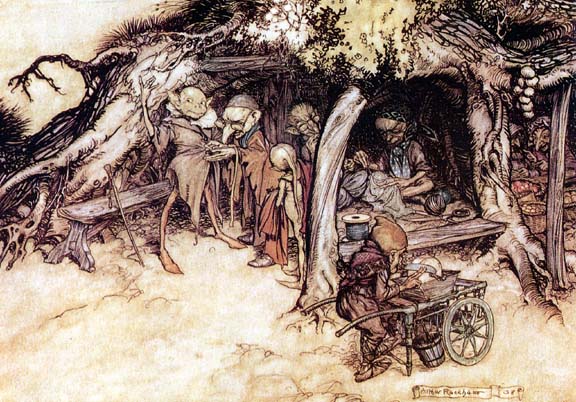Tolkien and Shakespeare. From The Big Think:
Contrary to popular opinion, J.R.R. Tolkien did not conjure Middle-earth from the depths of his imagination alone. When constructing his fictional universe, the celebrated fantasy writer took inspiration from a variety of literary and historical sources. These include the legend of Beowulf, Dante Alighieri’s Divine Comedy, the Anglo-Saxon invasion of England, and — last but not least — the plays of William Shakespeare.
The Bard’s influence on Middle-earth may not be obvious, not in the least because Tolkien didn’t really care for him. Tolkien’s scorn for Shakespeare — one he shared with literary heavyweight Leo Tolstoy — dates back to his school days. Serving as the secretary of the debating society at King Edward’s School in Birmingham, the future creator of The Hobbit and The Lord of the Rings once argued that Shakespeare’s plays were written by Francis Bacon, shocking his peers with what the student newspaper described as “a sudden flood of unqualified abuse upon Shakespeare, upon his filthy birthplace, his squalid surroundings, and his sordid character.”
Tolkien disliked Shakespeare so much that he once expressed regret at referring to one of Middle-earth’s races as Elves. While elves “is a word in ancestry and original meaning suitable enough,” he wrote to a friend in 1954, “the disastrous debasement of this word, in which Shakespeare played an unforgivable part, has really overloaded it with regrettable tones, which are too much to overcome.” Although he does not specify any plays, Tolkien must have had A Midsummer Night’s Dream and The Merry Wives of Windsor in mind. Both present elves as whimsical, lighthearted creatures who live in enchanted woods — a far cry from noble beings inhabiting the dark and dangerous forests of Middle-earth.
But while Tolkien was no fan of Shakespeare, his animosity toward the Bard has most certainly been exaggerated and oversimplified. For evidence, look no further than a letter he wrote to his son Christopher after seeing a performance of Hamlet. In it, Tolkien seems to argue, as many have done before and since, that Shakespeare ought to be seen on stage rather than read. “The part that came out as the most moving,” he admits, “almost intolerably so, was the one that in reading I always found a bore: the scene of mad Ophelia singing her snatches.”
Echoes of Hamlet and other plays can be heard throughout Middle-earth. But whether those echoes are positive or negative, conscious or unconscious, are different questions altogether. Many potential references to Shakespeare are so small and incidental that they might not have been intended at all. For example, critics have compared A Midsummer Night’s Dream‘s Oberon to The Hobbit‘s Gandalf because both play the role of the benevolent yet powerful guardian. Also, Bilbo tricking the trolls into arguing among themselves is similar to how Puck starts an argument between Lysander and Demetrius. And Beorn shapeshifting into a bear sort of resembles Theseus and Hippolyta assuming different identities. (Read more.)


















No comments:
Post a Comment